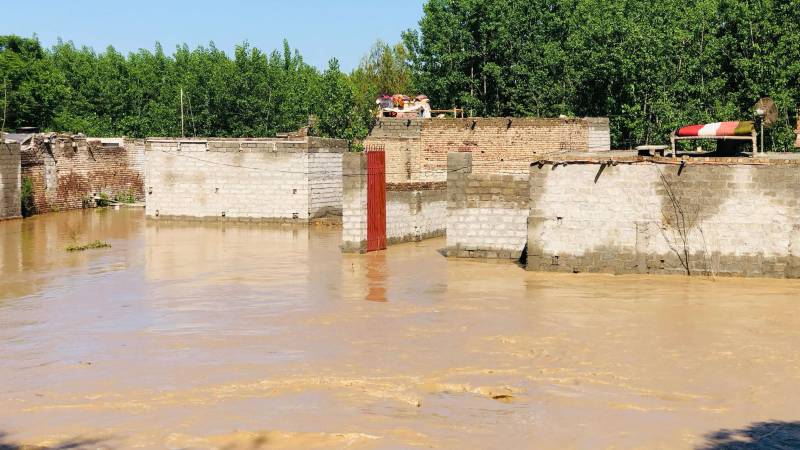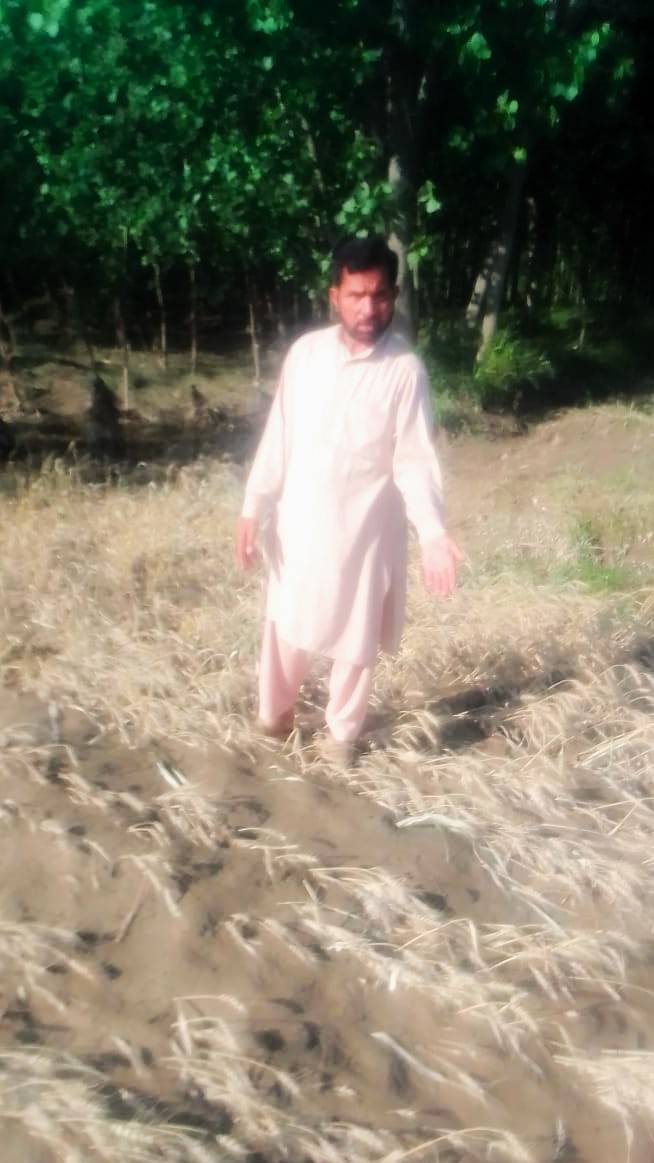
As winter came to an end in Khyber Pakhtunkhwa (KP) this year, it had one last sting to deliver. Torrential rains and hailstorms in March and April, usually witnessed during peak winter, damaged crops, houses, and civil infrastructure and cost as many as 73 lives.
For some, the damage from the rains and the hail reminded them of the rains and super floods of 2022, which wiped away large swathes of crops and infrastructure across KP.
According to the Khyber Pakhtunkhwa Provincial Disaster Management Authority (PDMA), at least 73 people lost their lives, while 92 were injured. Moreover, some 3,258 houses, including 482 completely and 2,776 partially, were affected by the torrential rains, which began on April 10 and lasted until April 29.
Similarly, crops spread over 44,320 acres were damaged, including wheat crops spread over 35,948 acres. According to the KP Crop Reporting Services Directorate General, crops such as wheat, gram, fodder, mustard and rapeseed, sugarcane, fruits, and vegetables were affected.
The Charsadda district, which lies at the junction of three key rivers, Swat, Jindi, and Kabul, is considered to be the province's third-largest food basket after Dera Ismail Khan and Mardan. Heavy rains and subsequent floods ravaged the region.
Abdul Wali, a 50-year-old farmer who lives in the Shulgara village near the banks of the River Swat, was one of the victims of the 2022 floods. As torrential rains lashed the region in April, followed by floods, he lost crops on around two acres of agricultural land.
"This time, it's wheat," Wali said, his voice striking a sombre tone. He said floods in the River Swat struck them in the third week of April.
"What will I do?" he asked, adding that no one and nothing seems to be safe from the rain and the floods, having suffered devastation twice at the hands of climate change in three years.
"I am still thinking about how I and other farmers will fulfill their need for wheat for the whole year for our families with the current rate of inflation," he added.
Wali, who is the president of the Model Farm Services in Charsadda district, briefly spoke with The Friday Times that flood waters in three union councils of the district, including Hisara Yasinzai, Agra and Tarnab, comprising 700 acres, with standing crops of wheat, which was due for harvesting in the first week of May along with fodder for livestock, was destroyed by the flood.

Farmers around River Swat did not expect a flood during this year's wheat harvest. He added that they expected the floods in the monsoon season, which lasts from late June through August, not in April.
The Model Farm Services president lamented that farmers in the district face severe weather events almost every year and that many farmers are finding it impossible to cope with the losses. He added that many farmers are still waiting for compensation for the loss they suffered in the 2022 flood.
Wali complained that the government is not helping farmers deal with the climatic hazards. He said the government provided only limited assistance for rebuilding homes, which was insufficient to complete reconstruction efforts. Moreover, he said that the assistance from the government did not help rebuild their livelihood, which was destroyed during the 2022 floods.
"We are humans; we may survive somehow, but how do we feed our livestock"? he said, adding that floods, both in 2022 and in April 2024, had washed away the fodder they had stored for their animals.
Wali also shared images with The Friday Times of his wheat crop before and after the floods.
However, climate change impacts don't just come in the form of heavy rain, hail, or snow but also in the form of extreme heat during summers. Wali said that as farmers hoped to recover from the floods last year, their tomato and muskmelon crops suffered from record temperatures in the district. He said that farmers were shocked to find that their crops become barren before the end of June, at least a couple of weeks before when they usually expect their tomato crops to ripen by the end of July.
Wali said that if things continue to worsen as they have over the past few years, they may have no choice but to give up farming. They would have no way to predict changes in weather to ensure a harvest at the end of the season.
Frequent and intense extreme weather events
KP Metrological Department's Deputy Director Fahim Khan told The Friday Times that global temperatures are rising and are intensifying the earth's water cycle. An increased evaporation rate results in higher frequency and intensity of storms, and contributes to drying in some areas.
Fahim said western disturbances — which are extra-tropical storms originating in the Mediterranean region that bring sudden winter rain to the northwestern parts of the Indian subcontinent— mostly occur during winter months in Pakistan, causing light rain. However, he said that in the past 20 years, they have observed that light winter rain has become more intense and has extended well into April, which is usually the tail end of the spring season.
This is why winter this year was dry in the beginning, and northern parts of the country received snowfall as late as the end of January, contrary to usual snowfalls in November and December.
Fahim said the frequency at which KP is experiencing extreme weather events in winter is alarming. He identified how, in April, the average rainfall in Peshawar is 68mm. But this year, it received 190mm of rainfall. Similarly, in Chitral, the average rainfall for April is 82mm, but this year, it received a whopping 237mm of rainfall. In District Dir, the average April rainfall is 170mm, but in April 2024, Fahim said the district received 365mm of rain, which is a record. The heaviest rainfall in April that has ever been recorded in the district was 253mm in 1995.
He said Chitral city usually receives its last snowfall of the season in March. But this year, it received heavy snowfall in April.
Fahim said if it had rained a little heavier in the last week of April, it would have broken all past rainfall records.
"Our records show that since 2000, extreme weather events have been increasing in the province," he said, adding that climate change is creating extreme weather events at a greater frequency and intensity globally. He pointed to the recent rainfall across the United Arab Emirates (UAE) and other African countries as proof of the change in the climate that has shocked the world.
The UN-led Intergovernmental Panel on Climate Change (IPPC) presented a brief to policymakers in its Sixth Assessment Report, released in 2021. The report pointed out how human-induced climate change has increased the frequency of extreme weather events, including heat waves, floods, droughts, extreme temperatures, heavy rainfall, and cyclones.
Climate change's threat to crops
KP Crop Reporting Services (CRS) Directorate General Muhammad Kaleem told The Friday Times that agriculture in the province has been suffering from impacts of climate change, such as rising temperatures, intense drought, and heavy rainfalls. He added that these abrupt and intense climatic changes are not only affecting the quality, but also the quantity of food being produced in the province, thus directly impacting food security.
He said that the super floods of 2022 extensively damaged the Kharif crops, while the recent hammering by rains and floods spoiled the Rabi crops.
We witnessed a long spell of drought during the sowing season from September to December, and now, there are heavy rains in April, he said, adding that it was the ultimate threat to the province's food security.
In response to a question about farmers' grievances, he said that they have observed that the areas over which crops are being cultivated are decreasing. One explanation for this, he suggested, was that farmers are unable to cope with the hazards introduced by climate change.
To resolve this, he said that the KP government has started working on climate-smart agriculture.
"We are working on climate-resilient varieties [of crops]," he said, adding that the project aims to introduce climate resilience to horticulture in the province and is part of the KP food security project.
"We have a food security policy in place in the province," he said.
Identifying climate change as the biggest threat to KP's agriculture, the KP CRS director urged all stakeholders to play their role in implementing certain policies and projects.
Despite the government's claims of operating projects to mitigate the impacts of climate change and policies related to food security, Kisan Board Khyber Pakhtunkhwa Chapter's President Rizwan Ullah told The Friday Times that he had recently attended a meeting with key government officials in Peshawar to discuss the impact of climate change on agriculture in the province.
All discussions yielded empty promises and were largely fruitless, Rizwan lamented.
He said that the government has talked an impressive game, but all of what they say they have done and will do is just exists in government documents with no on-ground manifestation.
Rizwan rejected the idea that the provincial government was facilitating farmers who had been impacted by climate change-related disasters.
The Kissan Board's provincial chief asked how farmers in the province could cope with the hazards posed by climate change if they had not received compensation or assistance from the government to cover the losses suffered nearly two years ago during the 2022 floods.
Speaking to The Friday Times via telephone, he said that given the current rate of inflation, farming had become an expensive proposition. He lamented that, on the one hand, the prices of fertilizer and other inputs have shot through the roof while, on the other, the government is not providing subsidies to farmers. Moreover, climate change hazards have made the working situation worse. He suggested the government take serious steps to support farmers while providing them compensation for the damage they have suffered and assistance in the form of lower prices for agricultural inputs and providing them with seeds for climate-resilient crops.
As KP lurches into summer and braces for another monsoon later this year, the World Meteorological Organisation (WMO) of the United Nations has already predicted above normal rainfall between June – September. Above-normal temperatures are also likely over much of the region, signalling the potential for another disaster this year. Monsoon rainfall in 2023 was widely below average, according to the WMO State of the Climate in Asia report. Currently moderate El Niño conditions are prevailing over the tropical Pacific Ocean and these are expected to weaken to neutral conditions during the early part of the monsoon season and then to transition to La Niña conditions during the second half of the monsoon season. However, there is uncertainty in its strength and the time of its onset, the WMO said.

